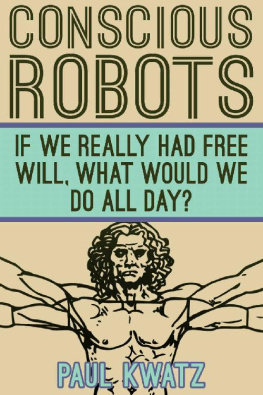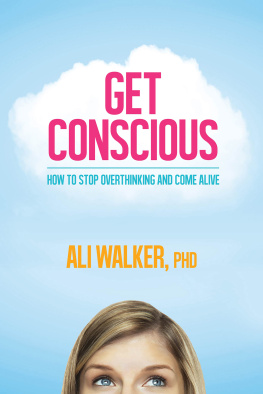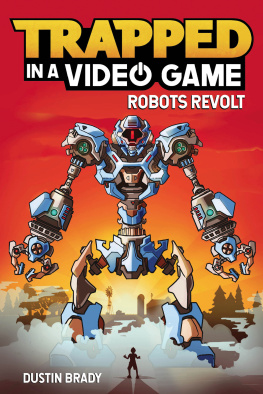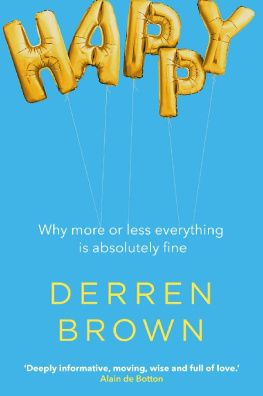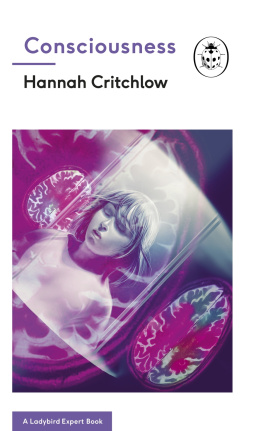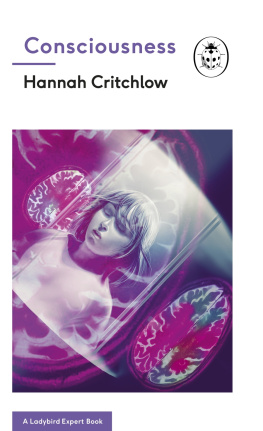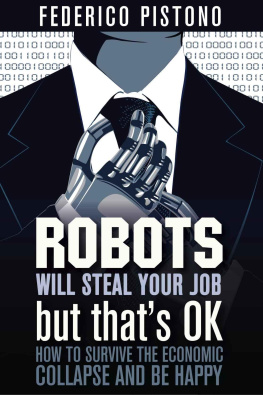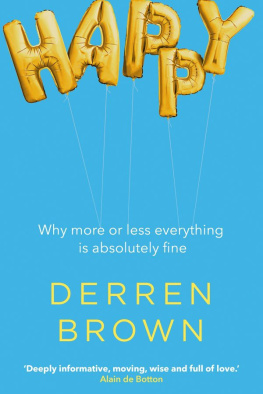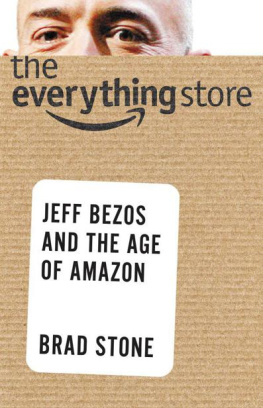Paul Kwatz
Peacocks Tail Publishing
Copyright Peacocks Tail Publishing
ISBN 978-0995069703
Amazon.com Reviews
An absolutely necessary book.
Should be taught in schools.
Dynamite, this is a brilliant book.
Bad ass!
Easy to understand and persuasive.
Fun, short, insightful.
It's an easy read, and lays out the bare truth with good humor. Let's get that Happiness Party started ASAP!
This book presents a unique, concise argument for the validity of determinism from an evolutionary standpoint. Bravo to the author, whoever he may be!
Paul has an idea that he wants to share and you'll do yourself a disservice if you don't consider it.
If a thoughtless ramble were a tweet
The most useless book I have ever looked at.
If you enjoy reading Conscious Robots, you can review it simply by going to bit.ly/ConsciousRobotsReview .
Publishe r s Note, April 2017
In March 2017, Jeff Bezos, soon to be the Worlds Richest Man, announced he'd be selling $1 billion Amazon shares every year to invest in his Blue Origin space rocket company.
"Each to his own," you might think. "Whatever makes you happy."
But having read Conscious Robots, you might think Well, thats not going to work. I can see how it could maximise the survival chances of his genes but I cant see how it will fool his subconscious into making him any happier.
Conscious Robots changes everything.
And it changes nothing because nothing can be changed.
You might enjoy it because it will take you to the logical extreme. As one reviewer commented, the book throws out the baby, bath water, tub and the sink.
Or you might enjoy it because it clears up a lot of the things in life that previously didnt make any sense at all.
But then you might hate it because, despite the promise, Facing up to the Reality of Being Human is pretty difficult and frustrating (but youll blame your own brain for those unpleasant feelings, of course).
The best I can promise is that in 107 minutes time, you might think you have a better way to spend $75 billion than Jeff Bezos.
Introduction
3000 years ago, the Earth was flat and the stars were gods.
The gods ruled the Earth, and they created humans as their playthings, rewarding the lucky ones with rich harvests and victorious battles, and punishing the rest of us with floods, earthquakes and nasty diseases.
If you caught one of those nasty diseases, there were no reliable cures - incantations and prayers would be required to drive out the evil spirits, and if that failed youd have to sacrifice a goat. Or maybe even a child.
Fortunately, weve come a long way since then.
The Earth is no longer flat, and the gods have delegated the majority of their powers to natural phenomena. We still sacrifice animals to cure our diseases, but those sacrifices take place in the laboratories of science rather than on the cold stone altars of Thor.
Weve even worked out why we exist. We can trace the origins of the Universe back to the Big Bang, and we can see how the ensuing cascade of physical interactions could place the stars in the cosmos and the Earth in its orbit around the sun. We can see how primitive life forms could emerge from the chemical swamp on the Earths surface, and gradually evolve to become creatures so complex and sophisticated that they can worry about the size of their own backsides.
We get it. We understand the world, we know whats going on.
And yet
And yet
Were still living on a Flat Earth. Or, rather, its modern equivalent. One day, well look back and say Did they really think like that in the 21st Century?
Its not that we havent done the science yet. The science is clear. What we havent done is accept what the science is telling us . Its as if weve gathered all the evidence that the Earth is round but we cant quite come to terms with such a crazy idea. Dont be daft. You can see for yourself - its obviously flat, we mutter, looking away and changing the subject.
So what is this modern equivalent of a Flat Earth?
Well
Theres no easy way to say this.
Were robots.
Not robots made of metal.
Were robots in the sense of being automatic machines , doing nothing more than following instructions ... from the day were born until the day we die. No freedom. Just doing what were programmed to do.
Its not the easiest idea to live with.
So one of the aims of this book is to help you live with it.
To help you accept that you are no more responsible for your actions and choices than the sun is responsible for the time it rises, a volcano is responsible for erupting, or the clouds responsible for the rain.
The book will also try to convince you that the thing you should be worrying about ... (if you could actually choose what to worry about)
is the mechanism by which your choices are controlled ,
... the mechanism that your programmers use to fool you into working for their benefit and not your own.
Its really the most elegant of con tricks.
Were programmed by millions of years of evolution to believe that The Unpleasant Things in Life - the things we work so hard to avoid - are caused either by
- uncontrollable events in the outside world ,
- or our own failures; our own failures to conquer and get control of what happens to us in that outside world.
Were programmed by evolution to believe that the reason life isnt an endless stream of joy and contentment is because we havent won yet :
- that if we had more money, our worries would slip away
- that a fine house and elegant possessions would satisfy our desires
- that if we had a successful career - and children! - wed be content.
Ha!
And we fall for all of it (especially the children thing).
In short, were conned into believing in happily ever after.
But happily ever after wont ever happen.
And not because we cant achieve all the things we set out to achieve.
Happily ever after wont happen regardless of what we achieve - because its simply not in the interests of our genes.
Its not in the interest of our genes to allow us to be satisfied with what weve got no matter how wealthy, successful or lucky in love we are.
Instead, our brains have been wired up to make us feel permanently dissatisfied.
Even if our lives look wonderful to almost everyone else, we will always want more. Its why millionaires strive to become billionaires, its why pop stars take drugs, its why perfect couples end up divorced. And it's why humans have conquered the planet.
Happiness is n t the reward for a life well-lived...
...i t s the mechanism used to control our behaviour.
This is the reality of being human.
Businessman Becomes First to Take Happy Pill
Yesterday, Jake McClure, Chairman of Genasoft and one of the worlds richest men, announced that he would be retiring from ordinary life and consigning himself to the so-called Happiness Bed. Although others are believed to have experienced The Bed of Roses for short periods, McClure is thought to be the first to commit for the rest of his life, and is certainly the first to talk openly to the worlds press. McClure, along with a dozen or so of the worlds wealthiest individuals, is said to have been a heavy investor in the research for the last 5 years.
McClure, 43, briefly answered questions from the press.
Could you tell us about the research project that has led to this possibility?

